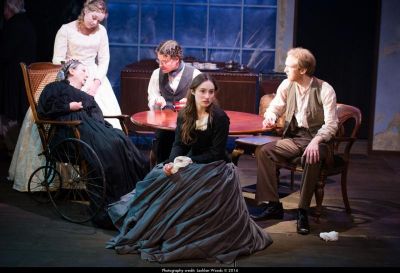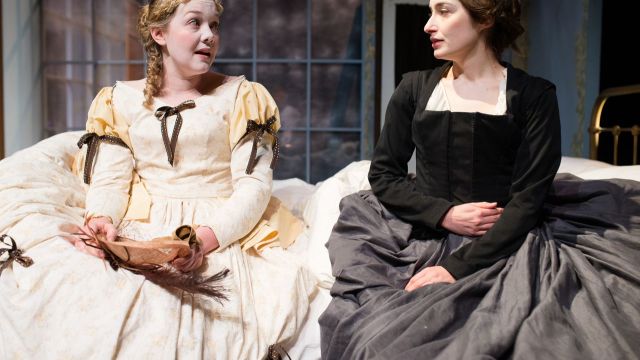Therese Raquin
There is so much good theatre in Melbourne, often far superior to the main stage offerings. Therese Raquin is a case in point; a hearty Gothic melodrama, it entertains throughout despite having some inevitable flaws.
Basically the story concerns the title character, forced into a loveless marriage with her benefactor’s sickly son, who then falls for an amoral artist. When a wild affair ensues the two plot to kill her husband and their actions bring the whole family to destruction. Sounds promising? Well, it is; and first kudos must go to director Abrahams, who adapted the play from Zola’s novel. It’s a good piece of writing, despite the second act needing some heavy cutting and fewer false endings.
Abrahams’ direction is also sure and innovative, but here he is helped by two stunning performances by two very different actresses. Marta Kaczmarek (and here I disclose that I am both a friend and a fan) is quite magnificent as the head of the family. She is at first the besotted simpering mother, openly flirtatious with her son; then the grieving, heartbroken matriarch after his death, and finally the wheelchair bound, drooling stroke victim, totally paralysed, mouth gaping … but watch how the woman can act with just her eyes. It is worth seeing the play for that alone. Small wonder that this performance is being talked about in all quarters.

Close behind her comes Elizabeth Nabben in the title role. She starts slowly, resigned to her fate, a woman dead inside, but when her passions are aroused by the artist Laurent, she bursts into life like a forest fire, then consumed by her own guilt. It’s a fine performance, particularly since she receives little help from Aaron Walton (Laurent). Walton may be a fine actor in something more modern, but he seems not to understand the style of the piece, or the whole idea of melodrama as the director defines it in his notes. He’s too modern, he mumbles when he should be declaiming, and he seems far too bland and doltish as a character to be a great seducer. Unfortunately, this makes the core relationship uneven, and when he does show consuming passion in the form of anger, it’s too little too late.
There’s strong support from Paul Blenheim as the milksop husband (Camille) and theatre stalwart Rhys McConnochie as the pompous and bumbling Michaud; and particularly refreshing performances from Edwina Samuels as the delightfully deluded Suzanne, and Oliver Coleman as the OCD beset Grivet (I especially look forward to seeing him again).
Jacob Battista has created a terrific set with limited resources (the transition to the river is particularly impressive) and Katie Sfetkidis gives us some distinctive lighting. Abrahams’ decision to musically underscore the entire play with Christopher de Groot’s music is a mistake for me. Underscoring should provide emotional resonance and it doesn’t. The music itself is indulgent and pervasive and having de Groot visible upstage through a scrim at all times simply distracts and pulls focus from the action. But these are only minor negatives. All in all Dirty Pretty Theatre can congratulate themselves on a strong production which never loses sight of the fact that entertainment is paramount.
Coral Drouyn
Photographer: Lachlan Woods.
Subscribe to our E-Newsletter, buy our latest print edition or find a Performing Arts book at Book Nook.

